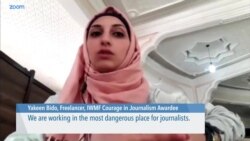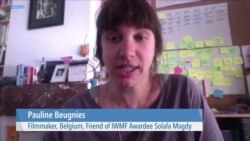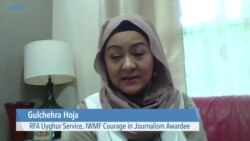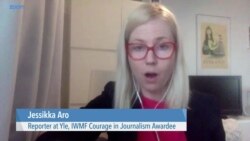“We are working in the most dangerous place for journalists,” said Yakeen Bido, a 25-year-old freelance reporter from Idlib, Syria.
As a female journalist in a war-ravaged country, Bido faces many difficulties. But she told VOA, “I don’t want to die where I can’t do anything for the people around me.”
Bido was one of four journalists recognized Wednesday with the International Women’s Media Foundation’s 30th Courage in Journalism award.
Along with Bido, the Washington-based group honored Jessikka Aro, of Finland’s public broadcaster Yle; Solafa Magdy, a multimedia journalist and founder of the Everyday Footage agency in Egypt; and Gulchehra Hoja, a journalist for Radio Free Asia (RFA).
“Each [of the] winners have had a tremendous impact on their communities through their work, and each have paid a heavy price for doing so,” Elisa Lees Muñoz, executive director of the IWMF, told VOA.
“Solafa Magdy, who is in prison for her work focusing on social justice issues in Egypt, is experiencing one of the heaviest tolls a journalist may face for their work.”
Egyptian authorities arrested Madgy in Cairo on Nov. 26, 2019. The following day she was criminally charged with being a member of a banned group and with spreading false news, according to the press freedom organization Committee to Protect Journalists.
Pauline Beugnies, a Belgian filmmaker and friend of Magdy’s, said that the journalist, who is in pretrial detention in Cairo, doesn’t know about the award.
“This courage award is really meaningful because I think [Solafa is] one of the most courageous women I know,” Beugnies told VOA. “She knew the situation was really bad, and she didn't stop reporting.”
Hoja has also been forced to balance risks to her and her family with the need to shed light on widespread human rights abuses in western China.
After reporting on China’s mass detention of Uighurs in Xinjiang, Hoja, who is based in Washington, lost contact with her family in the region. Over 20 relatives disappeared into what the Chinese government refers to as “reeducation camps.”
“I was so hopeless because we've been reporting about this terrifying, horrible story every day. And that day I also become the victim,” she said. “So I decided to speak out.”
Muñoz said that as a Uighur journalist, Hoja has a “unique position offering the only autonomous Uighur-language news outside of China, providing critical information to her community and to the world.”
The RFA journalist said that the award was proof that the work matters.
“I want to let my people know, no matter what language you're speaking, if you're speaking the truth, [the] world is listening to you,” she said.
RFA and VOA are both independent news outlets funded by U.S. taxpayers.
Taking on trolls
Finnish reporter Aro, who in September 2019 published Putinin Trollit, a book about Russian troll factories, has continued to report despite becoming a victim of the very issue she was investigating: online harassment and troll farms.
The journalist received threats, mostly anonymous, on social media, and attackers shared her personal information online. In October 2018, a Finnish court sentenced one perpetrator to 22 months in prison for defamation and negligence; two others received suspended sentences, according to news reports.
Aro told VOA she still receives threats. But as a journalist, she sees her role as keeping her audience informed. “If I would have stopped reporting about, for example the topic of Russian trolls or propaganda in general, then I would have let my audience down,” she said.
Muñoz said online attacks targeting journalists have become the norm. “They are incessant and pernicious and drive women journalists out of the profession, accomplishing what they are intended to do; to shut women up,” she said.
She added that research from the IWMF and TrollBusters, an organization that provides training and assistance to journalists, shows these attacks can result in post-traumatic stress and can incite actual physical attacks.
Empowering colleagues
Magdy, who has reported on human rights and political unrest in Egypt for outlets including BBC Egypt and the news website Mada Masr, set up Everyday Footage, an agency to train journalists in mobile journalism.
Beugnies said Magdy exemplifies how women found their voice after the Egyptian revolution.
In Syria, Bido spent the past five years reporting from her hometown of Idlib. She is the first woman to broadcast from the region, the IWMF said. She has received death threats from supporters of President Bashar Assad.
“This award is a symbol of courage not only for me, but for all women working in the press,” Bido told the IWMF. “It is an honor to have my name among the other winners – women who sacrifice their personal freedom in order to face social injustice.”
Bido and Magdy’s work is vital, Muñoz said.
“Solafa and Yakeen’s willingness to defy social norms to expose the truth in their societies is critical to challenging accepted narratives,” Muñoz said. “Their work is critical to exposing the challenges faced by women and men.”
She added, “They lead by example and, in Solafa’s case, they create an atmosphere where other women may feel empowered to do the same.”








